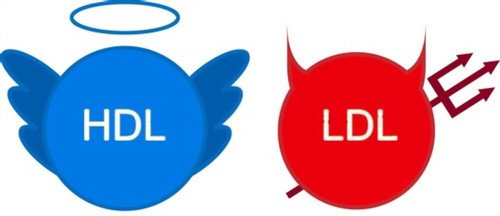Everyone’s heard about cholesterol, and no doubt has heard about the dangers of high cholesterol, but what exactly is it? What does it do?
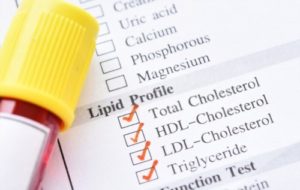
Although it gets a bad rap from the press, did you know that cholesterol is vital to the body, and that there are both good and bad types? Even the so-called bad is essential, but too much of a good thing can become detrimental to health.
Cholesterol is a type of blood fat or lipid which is made in the liver, as well as coming from animal products that we eat such as meat and dairy, although the liver provides enough for all the body needs, and the amount produced by the body should be reduced if a large amount is derived from food. It aids in the production of steroid hormones, assists the body to make vitamin D, and helps in the production of bile in the liver. Cholesterol is found in all cells and is the building block for all tissue – it is the body’s waxy repair system, helping to repair damaged tissue and providing a protective barrier.
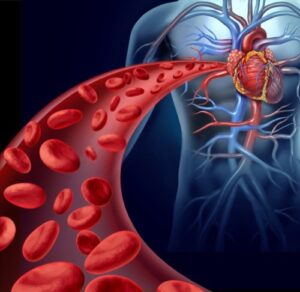 Since cholesterol, and another blood fat called triglyceride, cannot move freely through the blood they are attached to a protein to form a small parcel called a lipoprotein. Triglycerides are true fats derived from food (although some are also produced by the liver) which enter the bloodstream after eating and are used for energy or stored for later use. The liver releases these lipoproteins into the blood and they are carried to wherever the body needs them.
Since cholesterol, and another blood fat called triglyceride, cannot move freely through the blood they are attached to a protein to form a small parcel called a lipoprotein. Triglycerides are true fats derived from food (although some are also produced by the liver) which enter the bloodstream after eating and are used for energy or stored for later use. The liver releases these lipoproteins into the blood and they are carried to wherever the body needs them.
Experts state that cholesterol plays an important role in the healing process after surgery, since the liver sends cholesterol to the cut tissues, blood capillaries, veins and arteries to promote healing.
There are two kinds of cholesterol lipoproteins – LDL (low density lipoproteins), the so-called “bad” cholesterol and HDL (high density lipoprotein). LDL contains lots of cholesterol and its job is to carry cholesterol to wherever the body needs it. HDL is mainly made of protein and it carries excess cholesterol away from the cells and back to the liver where it can be broken down and used to make bile acids to assist in digestion. The body functions correctly on the right amount of cholesterol, too little or too much will affect overall health, although too much is the more serious.
LDL contains lots of cholesterol and its job is to carry cholesterol to wherever the body needs it. HDL is mainly made of protein and it carries excess cholesterol away from the cells and back to the liver where it can be broken down and used to make bile acids to assist in digestion. The body functions correctly on the right amount of cholesterol, too little or too much will affect overall health, although too much is the more serious.
Too much LDL leads to plaque accumulation on the artery walls which can narrow the blood vessels and restrict the flow of blood, oxygen and nutrients to the heart and other organs. A buildup of plaque can result in a condition called atherosclerosis which causes the arteries to narrow and harden, and this condition is further escalated by having high blood sugar, high blood pressure, and smoking, in addition to stress, obesity and family history.
Symptoms, which do not usually show until 70% or more of the artery is blocked, may include shortness of breath, chest pain (angine), heart palpitations, sweating, nausea and dizziness or weakness and can lead to an aneurysm or chronic kidney disease. 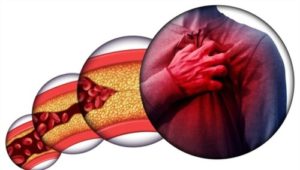 If the artery becomes completely blocked, when a piece breaks off and causes a blood clot, the result is a heart attack or stroke.
If the artery becomes completely blocked, when a piece breaks off and causes a blood clot, the result is a heart attack or stroke.
It should be noted that the formation of plaque can start in childhood since it is a slow progressive disease, so allowing your child to live on a diet of fast-food and/or convenient processed food is attributing to health problems later in life. Although experts are unclear of the role which triglycerides play, it is known that high levels of these are also associated with an increased risk of heart disease.
People with low levels of LDL are more prone to infection, which in severe cases could prove fatal, since LDL inactivates dangerous toxins and prevents them from damaging our bodies, and it also acts as an antioxidant, eradicating free radicals and minimising the damage to cells. Our immune system relies on cholesterol to fight infections and repair damaged cells, so a lack of cholesterol severely compromises the immune system. It should be further noted that high levels of HDL protect against a heart attack and stroke, whilst diminished levels increase the risk.
So what causes elevated levels of blood fats (cholesterol and triglycerides)? There can be a number of reasons, including diet, weight, exercise and heredity factors. Whilst we have no control over heredity factors, we can certainly limit the intake of saturated fats and cholesterol, and take regular exercise to increase our energy levels and burn more fats. High cholesterol can be controlled by choosing a healthier lifestyle, and even atherosclerosis can be partially reversed although some medication may still be required.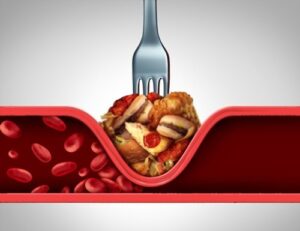
Diet plays a crucial role, and simple sugars or carbohydrates such as sucrose, glucose, fructose, maltose, corn syrup, molasses, and honey should be reduced. Try substituting sodas to sugar free or diet varieties, reduce the amount of sugar on cereal and in beverages, and be aware that “fat-free” usually entails a higher sugar content. Minimise saturated fats (found in meat products such as meat, butter, cheese and full-fat milk) and trans fats (found in fast foods, fried foods and used in processed foods to extend the shelf-life), and concentrate on healthier foods such as fruits, vegetables, fish, poultry, and whole grains.
A change in diet, increased exercise and weight loss where necessary, will help to lower LDL levels and increase HDL levels, and help you to manage cholesterol levels for life. However nature has also provided some alternative healthy ways to help maintain a healthy level:
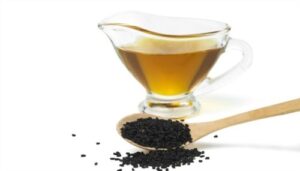 Black Seed Oil
Black Seed Oil
Natural Black Seed Oil is the strongest natural remedy for lowering blood cholesterol. It is high in fatty acids such as linoleic acid and oleic acid which can help to maintain healthy cholesterol levels. There have been a wide range of studies which have confirmed that the daily intake of Black Seed Oil helps to significantly reduce the LDL (bad) and triglyceride levels and in some cases higher the HDL (good) levels. This included studies showing the effects on obesity and diabetes, as well as the average person.
It is believed that Black Seed may prevent the absorption of cholesterol into the bloodstream in the small intestine, as well as helping to remove cholesterol from the blood by increasing the number of LDL receptors in the liver, and preventing the oxidation of LDL due to its strong antioxidant properties. Take one teaspoon every morning on an empty stomach. Maybe mixed with honey, and a little warm water (not boiling) if the taste is too strong.
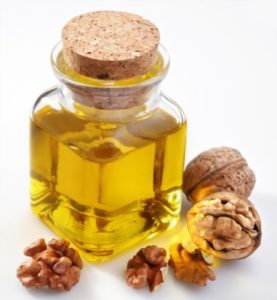 Walnut Oil
Walnut Oil
Walnuts have been the subject of many studies regarding their effect on cardiovascular health, including both long-term and short-term studies. 26 studies, using the data from more than 1000 people, were reviewed in 2018 and it was concluded that a walnut rich diet resulted in lower total cholesterol, lower LDL, lower triglycerides and even lower apoprotein B, which is a protein further linked to cardiovascular disease by science.
Outside of cholesterol levels, it has been established that walnuts, possibly due to alpha-linolenic acid, an omega-3 fatty acid which it contains in high amounts, can decrease the risk of developing heart disease by 10%. Further studies also indicated that walnut can increase HDL (good) cholesterol levels, in addition to reducing plaque formation, blood pressure and inflammation. Walnut can easily be incorporated into the diet by using walnut oil either as a daily dose or, with its nutty taste, as a salad dressing, incorporated into desserts or smoothies, or used as a finishing oil,etc.
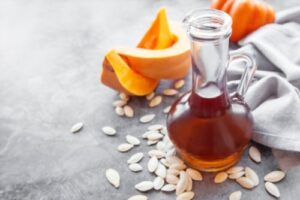 Pumpkin Seed Oil
Pumpkin Seed Oil
Pumpkin Seed Oil contains high amounts of omega-3 and omega-6 fatty acids known to help increase the level of HDL (good) levels. Several studies have taken place regarding the impact of Pumpkin Seed Oil on cardiovascular health and results have been extremely promising. The oil contains phytosterols which are similar to the body’s cholesterol and thus they compete with the body’s cholesterol for absorption in the digestion system, effectively blocking some cholesterol absorption and decreasing LDL (bad) cholesterol levels.
Research has also indicated that Pumpkin Seed Oil can reduce atherosclerosis. Pumpkin Seed Oil has a rich nutty flavour. Incorporate into desserts or smoothies, use as a finishing oil for dishes or as a dressing on salads, etc, or take a teaspoon every morning.
There are also herbal teas available which make a wonderfully refreshing and healthy beverage, whilst giving a helping hand with cholesterol levels:
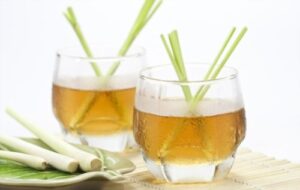 Lemongrass Tea
Lemongrass Tea
With its refreshing lemon flavour and citrusy aroma, Lemongrass Tea is sure to be a favourite alternative to harmful sugary sodas. Research indicates that if can help to maintain normal cholesterol and triglyceride levels. An animal study, published in the African Journal of Biotechnology in 2007, confirmed that Lemongrass significantly reduced high cholesterol levels. Whatsmore, if you are trying to lose weight too in a bid to control cholesterol, Lemongrass increases metabolism and helps the body to burn more fat, and reduces hunger pangs.
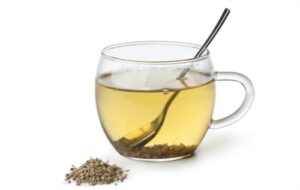 Anise Tea
Anise Tea
With its sweet and aromatic liquorice flavour, Anise Tea is a welcome beverage at any time, but is especially noted as being a great digestive when taken after a meal. Research has shown that Anise can help to reduce cholesterol levels by preventing bile from being reabsorbed into the small intestine, thereby requiring the use of more cholesterol to produce bile, and therefore lowering LDL (bad) cholesterol levels. Anise Tea can also help with weight loss by promoting an efficient digestion, and can help to reduce any sweet cravings.
So next time you reach for the convenience of processed food or a takeaway, remember that everything is OK in moderation. It’s keeping a balance which is important, but it’s even better when Mother Nature can help help tip the scales in our favour!
